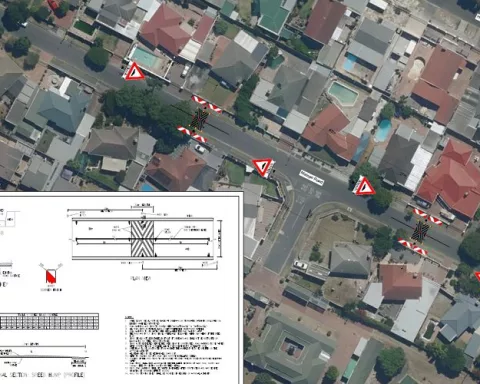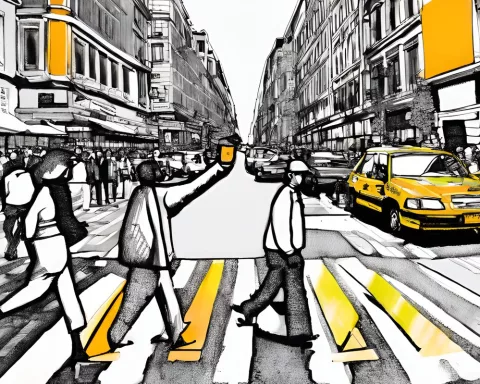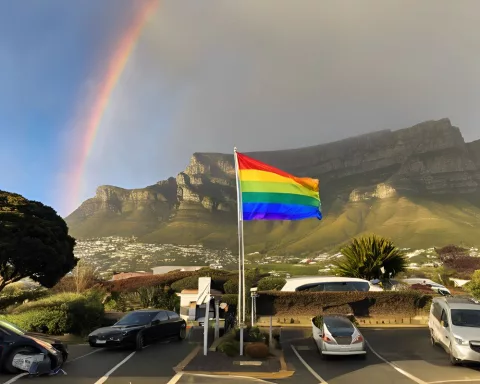Cape Town’s commitment to road safety was highlighted by Councillor Rob Quintas during the Global Alliance of Cities for Road Safety’s summit. The city has implemented various traffic calming initiatives, constructed speed bumps and pedestrian crossings, and expanded its public transportation network. Innovative approaches, such as variable speed signs and unique traffic signaling systems, have been used to improve safety. The city is dedicated to creating safer roads and promoting shared responsibility among all road users.
Cape Town’s Remarkable Progress in Road Safety
Councillor Rob Quintas highlighted Cape Town’s impressive progress in road safety during the Global Alliance of Cities for Road Safety’s summit. The city has implemented various traffic calming initiatives, constructed speed bumps and pedestrian crossings, and expanded its public transportation network. Quintas emphasized the city’s commitment to pedestrian safety and the need for a holistic transportation strategy. Cape Town is also using innovative approaches, such as variable speed signs and unique traffic signaling systems, to improve safety. The city is dedicated to creating safer roads and promoting shared responsibility among all road users.
In the context of the Global Alliance of Cities for Road Safety’s summit held in Cape Town, Councillor Rob Quintas boldly discussed the crucial subject of road safety. He used his welcome address to spotlight the actions of the City’s Urban Mobility Directorate in pursuing a safer environment for travel, underlining the seriousness of the issue.
Cape Town’s Remarkable Progress in Road Safety
Quintas drew focus to the compelling statistical proof of Cape Town’s commitment to road safety. He shared the city’s comprehensive involvement in executing traffic calming initiatives throughout 311 schools and the addition of safety precautions at 105 other sites. The construction of 257 speed bumps, 31 elevated pedestrian crossways, and an extra 12 raised intersections showcased the impressive progress made thus far.
Quintas’s speech served as a vehement appeal and a sign of the city’s relentless quest for maximum safety for all who use the roads. The emphasis was not purely on drivers, but also on the most exposed road users like walkers, cyclists, the elderly, and individuals with disabilities.
Ensuring Safety for Pedestrians
In Cape Town, where a striking 42% of commuters travel on foot to their destinations, pedestrian safety is of utmost importance. This priority reverberates strongly in Cape Town’s Integrated Development Plan (IDP), which acknowledges the importance of non-motorized transport. As a result, every initiative launched by the City’s Urban Mobility Directorate actively considers improvements in road safety.
Quintas also shed light on the link between the city’s public transit system, pedestrian safety, and economic circumstances. High poverty levels lead to a significant pedestrian population, especially at month-end, underscoring the need for a holistic transportation strategy that incorporates affordable public transportation and safe walking paths.
Promoting Public Transportation and Infrastructure
The city has already taken considerable steps in expanding the breadth of the MyCiTi bus service, a solid public transportation network. Quintas talked about plans to extend the service to Wynberg and Claremont, introducing pedestrian-friendly infrastructure such as separate walkways, exclusive crossings, and potentially, bicycle lanes.
Quintas took a moment to reflect on certain successful projects. The new pedestrian bridge in Lentegeur was an acclaimed accomplishment, providing a safe railway crossing and access to the new MyCiTi station. Moreover, the City’s Traffic Calming Policy prioritizes safety upgrades around schools, where the largest number of exposed road users, primarily children, are located.
Innovative Approaches for Safer Transportation
In a bid to control the speed limit in areas with high pedestrian traffic, the City has introduced 40km/h speed zones in certain regions. A particularly insightful innovation was the placement of variable speed signs that have reduced speeding by up to 25%. Also, unique traffic signaling systems have been installed for the MyCiTi bus service, thereby reducing confusion and minimizing the incidence of collisions.
However, the City isn’t resting on its successes. Last year, it welcomed residents and stakeholders to contribute ideas to the review of its Traffic Calming Policy and Road Safety Strategy. With an overwhelming response of over 3,000 submissions, the City is now incorporating these suggestions into the review process.
Encouraging Behavioral Change and Shared Responsibility
Throughout his speech, Quintas reiterated the role of the Global Alliance of Cities for Road Safety and expressed gratitude for the chance to host the conference. He concluded his address by emphasizing accountability and shared responsibility, underlining that the efforts invested in solutions and innovations will only be successful with behavioral change on the roads.
In summary, Quintas’s address stood as a testament to Cape Town’s unwavering commitment to road safety. It served as a confirmation that the City is, indeed, leading the way in creating safer roads, promoting a culture of respect for all road users, and setting the stage for sustainable urban mobility.
What initiatives has Cape Town implemented to improve road safety?
Cape Town has implemented various traffic calming initiatives, constructed speed bumps and pedestrian crossings, and expanded its public transportation network. The city is also using innovative approaches, such as variable speed signs and unique traffic signaling systems, to improve safety.
What is Cape Town’s priority when it comes to road safety?
Cape Town places a strong emphasis on pedestrian safety, particularly since 42% of commuters travel on foot to their destinations. The city acknowledges the importance of non-motorized transport and actively considers improvements in road safety in every initiative launched by the Urban Mobility Directorate.
How is Cape Town promoting public transportation and infrastructure?
Cape Town has already taken considerable steps in expanding the MyCiTi bus service, a solid public transportation network. Plans are underway to extend the service to Wynberg and Claremont, introducing pedestrian-friendly infrastructure such as separate walkways, exclusive crossings, and potentially, bicycle lanes.
What innovative approaches has Cape Town taken towards safer transportation?
Cape Town has introduced 40km/h speed zones in areas with high pedestrian traffic, reduced speeding by up to 25% with variable speed signs, and installed unique traffic signaling systems for the MyCiTi bus service. The city is also reviewing its Traffic Calming Policy and Road Safety Strategy, incorporating suggestions from residents and stakeholders.
How is Cape Town encouraging behavioral change and shared responsibility?
Councillor Rob Quintas emphasized the need for shared responsibility among all road users. The efforts invested in solutions and innovations will only be successful with behavioral change on the roads. The city is promoting a culture of respect for all road users and setting the stage for sustainable urban mobility.
What is Cape Town’s progress towards road safety?
Councillor Rob Quintas highlighted Cape Town’s impressive progress in road safety during the Global Alliance of Cities for Road Safety’s summit. The city has implemented various traffic calming initiatives, constructed speed bumps and pedestrian crossings, and expanded its public transportation network. The city is dedicated to creating safer roads and promoting shared responsibility among all road users.












